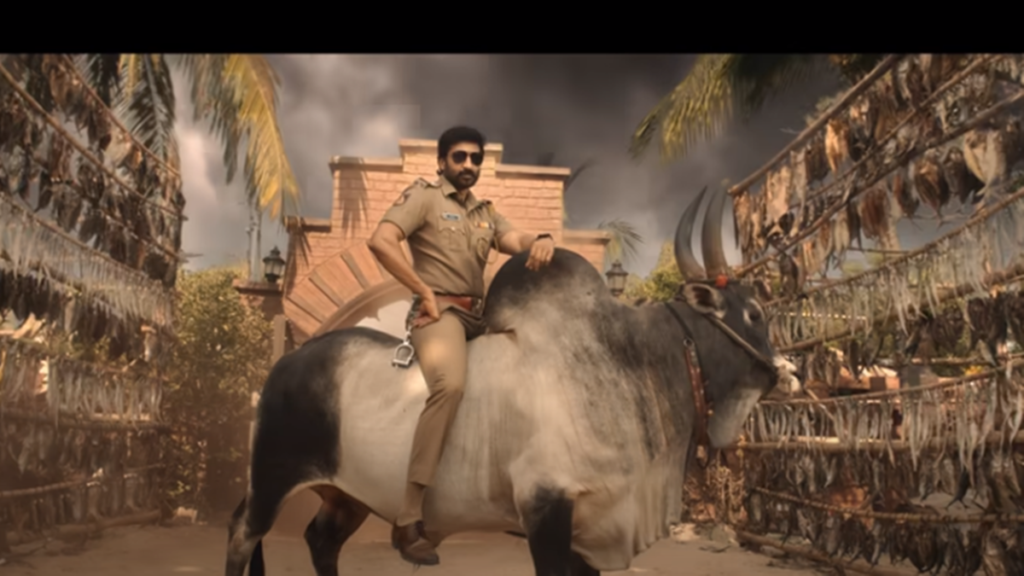Bhimaa Movie Review: Gopichand’s Dual Role Spectacle
Movie Name: Bhimaa
Release Date: March 8, 2024
Cast: Gopichand, Malavika Sharma, Priya Bhavani Shankar, Nassar, Mukesh Tiwari, Vennela Kishore
Director: Harsha
Producer: K K Radhamohan
Music: Ravi Basrur
Banner: Sri Sathya Sai Arts
Bhimaa, featuring Gopichand, has captivated the audience with its engaging fight sequences and photography, alongside Malavika Sharma’s glamour, and a climax that stands out. However, the flashback scenes might cause some confusion.
Bhimaa is marked as a Gopichand signature film, with Priya Bhavani Shankar and Malavika Sharma as the female leads, directed by Harsha, and produced by K K Radhamohan. The music is composed by Ravi Basrur. Released amidst high expectations, let’s see what the movie offers. Gopichand raises intrigue by stating this is a unique film in his career.
The film’s setting is the sacred Parashurama Kshetram, now known as Mahendragiri, where residents believe in the spiritual power of an ancient Shiva temple and a ‘Shakti Lingam’ constantly bathed in Ganga water. A strong belief exists that spirits fulfill their last wish on the 11th day after death.
The presence of Parashurama is believed to bring sanctity to the land, rich in medicinal plants. Ravindra Varma (Nassar) uses these plants for healing, while Bhavani (Mukesh Tiwari) exercises his dominance through illegal activities, supported by officials.
Into this setting arrives ‘Bhimaa’ (Gopichand), a police officer who starts investigating the ongoing illegal activities and the mysterious closure of the temple, aiming to uncover the mastermind behind these acts.
During his investigation, Bhimaa falls in love with Vidya (Malavika Sharma). He faces challenges from Bhavani’s gang, aiming to stop his interference in their activities.
The story unfolds with Bhimaa’s actions against these challenges, revealing the illegal trade, the reason behind the temple’s closure, and Bhimaa’s emotional connection to the name ‘Rama’.
Set in 2003, the director Harsha presents an interesting narrative. The first half of the film balances comedy and action, maintaining suspense from both the villain’s and the hero’s family emotional perspectives. Gopichand, as a senior police officer, and Malavika Sharma, in a glamorous role, have been significantly highlighted.
The interval bang piques interest for the second half, which introduces a new hero and heroine, adding to the storyline. While some aspects seem weak, the overall variation is appreciable.
The pre-climax twist might be anticipated by some viewers, but the climax remains unpredictable, explaining why the story is set in Parashurama Kshetram.
Gopichand performs dual roles, bringing variation to each. His appearance and fitness level are commendable, though some comedy scenes felt overdone.
Malavika Sharma shines in her role, though her signature romantic expressions may not appeal to everyone. The frequent shifts to flashbacks create some confusion.
Vennela Kishore’s comedy, involving a series of missing person posters, entertains without overwhelming. Other cast members adequately fulfill their roles. Ravi Basrur’s music and the song “Edo Edo Maya” are highlights, though the background score could have been better.
Swami J. Gowda’s cinematography is a significant asset, capturing the essence of forests, night effects, and ancient temple scenes beautifully.
For fans expecting high-octane action scenes from a Gopichand movie, Bhimaa does not disappoint. While some dialogues and scenes may seem excessive or cliché, there are enough elements to keep Gopichand’s fans engaged.
Positive Points: Story, narration, Gopichand’s appearance, action sequences, Malavika Sharma’s glamour, Vennela Kishore’s comedy, climax.
Negative Points: Some overdone comedy by Gopichand, Naresh’s comedy, and a few excessively dramatic dialogues.
Also Read and watch: Valari Movie Review (ETV Win)

